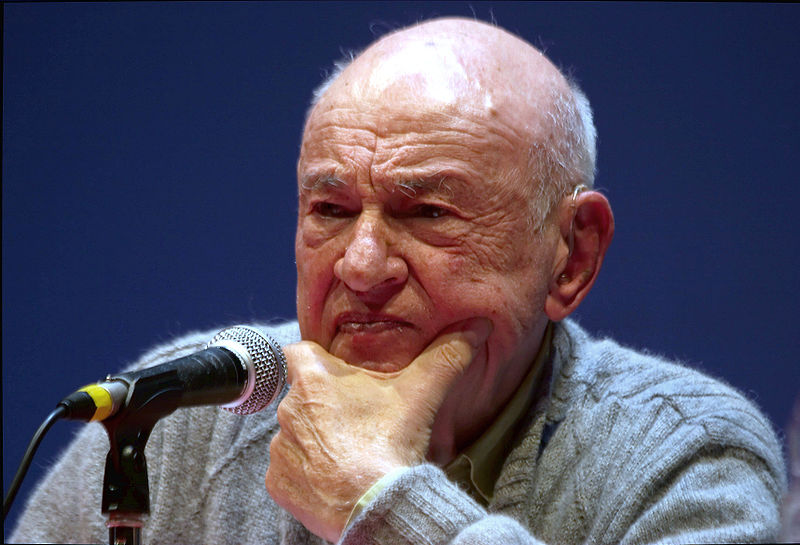<Back to Index>
- Philosopher and Sociologist Edgar Morin, 1921
PAGE SPONSOR

Edgar Morin is a French philosopher and sociologist born Edgar Nahoum in Paris on July 8, 1921. He is of Judeo - Spanish (Sefardi) origin. He is known for the transdisciplinarity of his works.
At the beginning of the 20th century, Morin's family migrated from the Greek city of Salonica (Thessaloniki) to Marseille and later to Paris, where Edgar was born. He first became tied to socialism in connection with the Popular Front and the Spanish Republican Government during the Spanish Civil War. When the Germans invaded France in 1940, Edgar fled to Toulouse, where he assisted refugees and committed himself to Marxist socialism. As a member of the French Resistance he adopted the pseudonym Morin, which he would use for the rest of his life. He joined the French Communist Party in 1941. In 1945, Morin married Violette Chapellaubeau and they lived in Landau, where he served as a Lieutenant in the French Occupation army in Germany.
In 1946, he returned to Paris and gave up his military career to pursue his activities with the Communist party. Due to his critical posture, his relationship with the party gradually deteriorated until he was expelled in 1951 after he published an article in Le Nouvel Observateur. In the same year, he was admitted to the National Center of Scientific Research (CNRS).
Morin founded and directed the magazine Arguments (1954 – 1962). In 1959 his book Autocritique was published.
In 1960, Morin traveled extensively in Latin America, visiting Brazil, Chile, Bolivia, Peru and Mexico. He returned to France where he published L'Esprit du Temps.
That same year, French sociologist Georges Friedmann brought him and Roland Barthes together to create a Center for the Study of Mass Communication that, after several name changes, became the Edgar Morin Center of the EHESS, Paris.
Beginning in 1965, Morin became involved in a large multidisciplinary project, financed by the Délégation Générale à la Recherche Scientifique et Technologique in Plozévet.
In 1968, Morin replaced Henri Lefebvre at the University of Nanterre. He became involved in the student revolts that began to emerge in France. In May 1968, he wrote a series of articles for Le Monde that tried to understand what he called "The Student Commune." He followed the student revolt closely and wrote a second series of articles in Le Monde called "The Revolution without a Face," as well as co-authoring Mai 68: La brèche with Cornelius Castoriadis and Claude Lefort.
In 1969, Morin spent a year at the Salk Institute for Biological Studies in La Jolla, California.
In 1983, he published De la nature de l’URSS, which deepened his analysis of Soviet communism and anticipated the Perestroika of Mikhail Gorbachev.
Morin was married to Johanne Harrelle, with whom he lived for 15 years.
In 2002, Morin participated in the creation of the International Ethical, Scientific and Political Collegium.
According to Alfonso Montuori in "Edgar Morin: A partial introduction"
"The 5 volume Method is perhaps Morin’s culminating work, a remarkable and seemingly inexhaustible treasure trove of insights, reflection, and a real manual for those who are interested in broadening the nature of human inquiry. Drawing on cybernetics, information theory, systems theory, but also integrating all the work he has done before, from the work on imagination in his research on movies to his profound reflections on death, Method integrates Morin’s journey and provides the reader with an alternative to the traditional assumptions and method of inquiry of our time.".